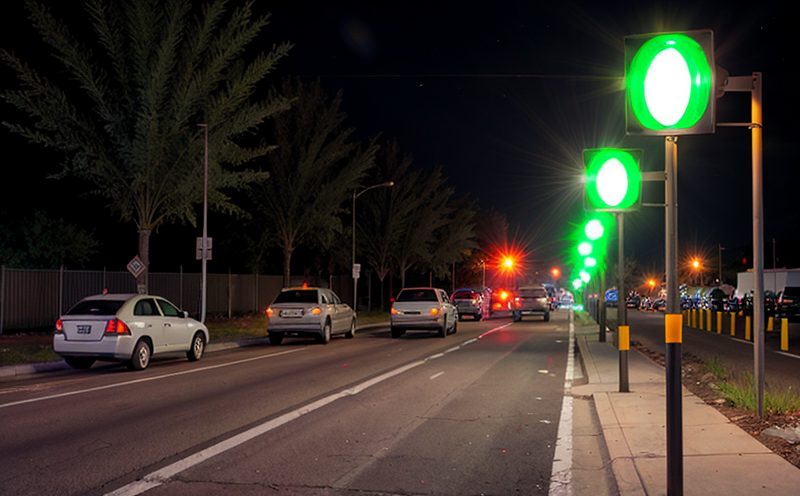EN 50293 Electrical Safety Testing of Traffic Signal Control Units
The EN 50293 standard is a critical component in ensuring the safety and reliability of traffic signal control units (TSCUs). This regulation addresses potential hazards associated with electrical systems, particularly focusing on preventing accidents caused by malfunctions or failures. Compliance with this standard ensures that TSCUs are designed, manufactured, installed, and maintained to meet stringent safety requirements.
The standard covers a wide range of tests aimed at assessing the electrical integrity and operational stability of TSCUs. These include insulation resistance testing, earth continuity checks, voltage drop measurements across various points within the system, as well as surge protection assessments. By adhering to these rigorous standards, manufacturers can guarantee that their products will perform reliably under all conditions.
One key aspect of EN 50293 is its emphasis on continuous improvement through regular audits and updates based on feedback from users and industry experts. This ensures that the latest technological advancements are incorporated into future versions of the standard, thereby enhancing overall safety standards for traffic signal control units.
To fully understand how EN 50293 applies to your organization's needs, it is essential to consider both the specific requirements outlined in the standard as well as broader industry practices. For example, many companies choose to conduct additional testing beyond what is prescribed by EN 50293 when dealing with particularly sensitive environments or high-risk applications.
The importance of electrical safety cannot be overstated, especially in areas where human life could potentially be at risk due to poor design or maintenance practices. By investing time and resources into ensuring compliance with this standard, you not only protect your employees but also contribute positively towards improving public safety overall.
Scope and Methodology
The scope of EN 50293 covers the electrical safety aspects of traffic signal control units (TSCUs), which include all components that form part of the system responsible for managing traffic signals. This encompasses power supply units, communication interfaces, microcontrollers, sensors, actuators, and any other elements involved in controlling pedestrian crossing points.
| Test Description | Methodology | Expected Outcome |
|---|---|---|
| Insulation Resistance Test | Apply a test voltage between conductors and earth or between different pairs of conductors, then measure the resulting current. | The insulation resistance should be within specified limits to ensure effective isolation from ground. |
| Earth Continuity Check | Measure the electrical connection between the earth terminal and other parts of the TSCU using a multimeter or similar device. | A low-resistance path indicating good grounding is desirable, while high resistance suggests potential issues that need addressing. |
| Voltage Drop Measurement | Measure voltage differences across key points in the circuit to identify any significant losses indicative of poor connections or faulty components. | The measured values should fall within acceptable ranges specified by EN 50293 to maintain optimal performance levels. |
| Surge Protection Assessment | Evaluate the surge protection devices installed in the TSCU against expected lightning strikes and other transient events. | The device must withstand defined stress conditions without failure, ensuring continued operation during hazardous situations. |
These tests are performed according to internationally recognized practices detailed within EN 50293. Adherence ensures consistent results across different laboratories and jurisdictions, providing confidence in the accuracy and reliability of the findings.
Industry Applications
- Urban traffic management systems
- Railway signaling networks
- Airport ground handling operations
- Metro and bus rapid transit systems
- Smart city infrastructure projects involving connected vehicles
- Automated parking facilities requiring precise timing control
In each of these sectors, ensuring compliance with EN 50293 is crucial for maintaining the highest level of safety standards. Proper electrical testing not only helps prevent accidents but also supports efficient operations by minimizing downtime due to system failures.
Competitive Advantage and Market Impact
Compliance with EN 50293 provides several advantages for manufacturers, installers, and operators of traffic signal control units:
- Enhanced Reputation: Demonstrating commitment to safety standards enhances brand reputation among clients and stakeholders.
- Increased Confidence: Clients gain greater trust knowing that their systems meet stringent international regulations.
- Easier Market Access: Meeting these requirements opens up opportunities in both domestic markets as well as export destinations where local authorities mandate compliance with specific standards.
- Better Product Quality: The rigorous testing process helps identify and rectify defects early on, leading to higher quality products.
The widespread adoption of EN 50293 across various industries underscores its significance in promoting global consistency and harmonization. As more countries align their regulations with this standard, those who already comply find themselves better positioned to compete internationally.





